Psychology Report: Reflective Best Self Exercise Analysis
VerifiedAdded on 2023/01/18
|24
|6740
|95
Report
AI Summary
This report presents an analysis of the Reflective Best Self (RBS) exercise, a tool used to identify personal strengths through feedback from close acquaintances. The report begins with an executive summary and table of contents, followed by an introduction that explains the purpose of the exercise and the methodology used to gather feedback from eight participants. A comprehensive literature review on positive psychology and the RBS exercise is provided, discussing concepts such as character strengths, psychological wellness, and the benefits of positive feedback. The report then outlines the methodology used to collect and analyze participant responses, followed by the findings and a summary table highlighting key strengths. A reflection section and a vision statement derived from the reflection are included, along with a conclusion summarizing the key insights gained from the exercise. The report emphasizes the importance of self-assessment and the role of positive psychology in personal development.
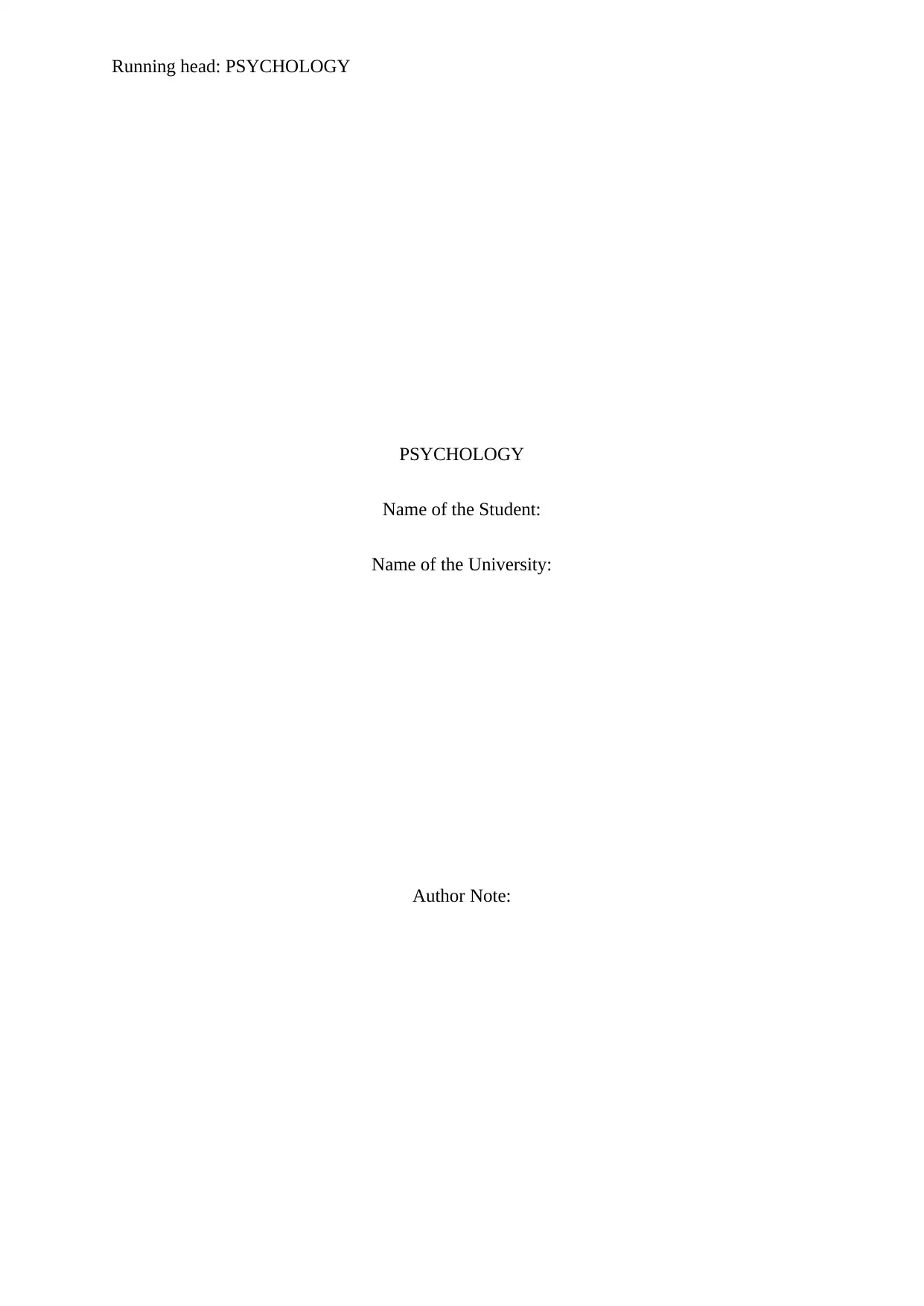
Running head: PSYCHOLOGY
PSYCHOLOGY
Name of the Student:
Name of the University:
Author Note:
PSYCHOLOGY
Name of the Student:
Name of the University:
Author Note:
Paraphrase This Document
Need a fresh take? Get an instant paraphrase of this document with our AI Paraphraser
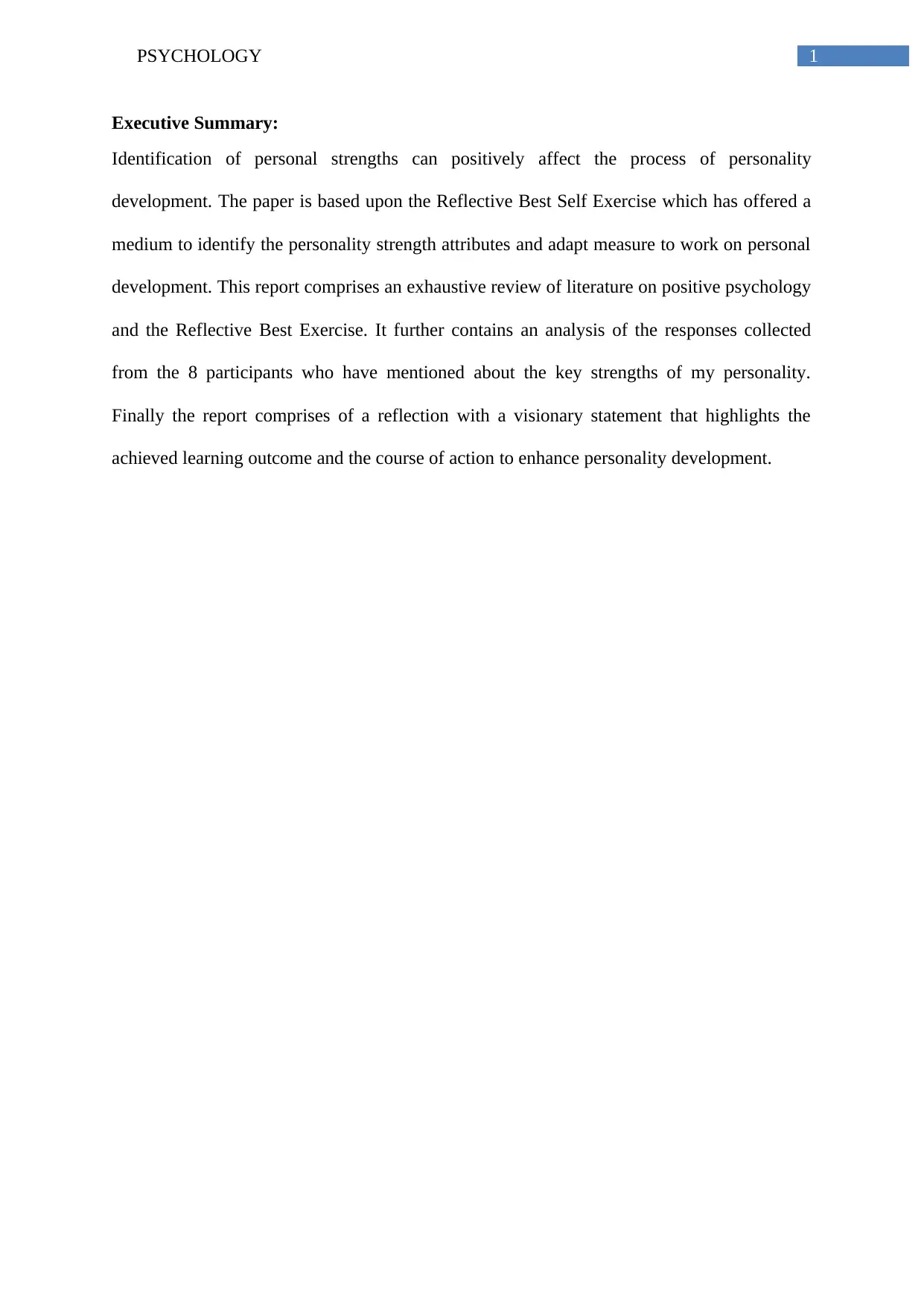
1PSYCHOLOGY
Executive Summary:
Identification of personal strengths can positively affect the process of personality
development. The paper is based upon the Reflective Best Self Exercise which has offered a
medium to identify the personality strength attributes and adapt measure to work on personal
development. This report comprises an exhaustive review of literature on positive psychology
and the Reflective Best Exercise. It further contains an analysis of the responses collected
from the 8 participants who have mentioned about the key strengths of my personality.
Finally the report comprises of a reflection with a visionary statement that highlights the
achieved learning outcome and the course of action to enhance personality development.
Executive Summary:
Identification of personal strengths can positively affect the process of personality
development. The paper is based upon the Reflective Best Self Exercise which has offered a
medium to identify the personality strength attributes and adapt measure to work on personal
development. This report comprises an exhaustive review of literature on positive psychology
and the Reflective Best Exercise. It further contains an analysis of the responses collected
from the 8 participants who have mentioned about the key strengths of my personality.
Finally the report comprises of a reflection with a visionary statement that highlights the
achieved learning outcome and the course of action to enhance personality development.
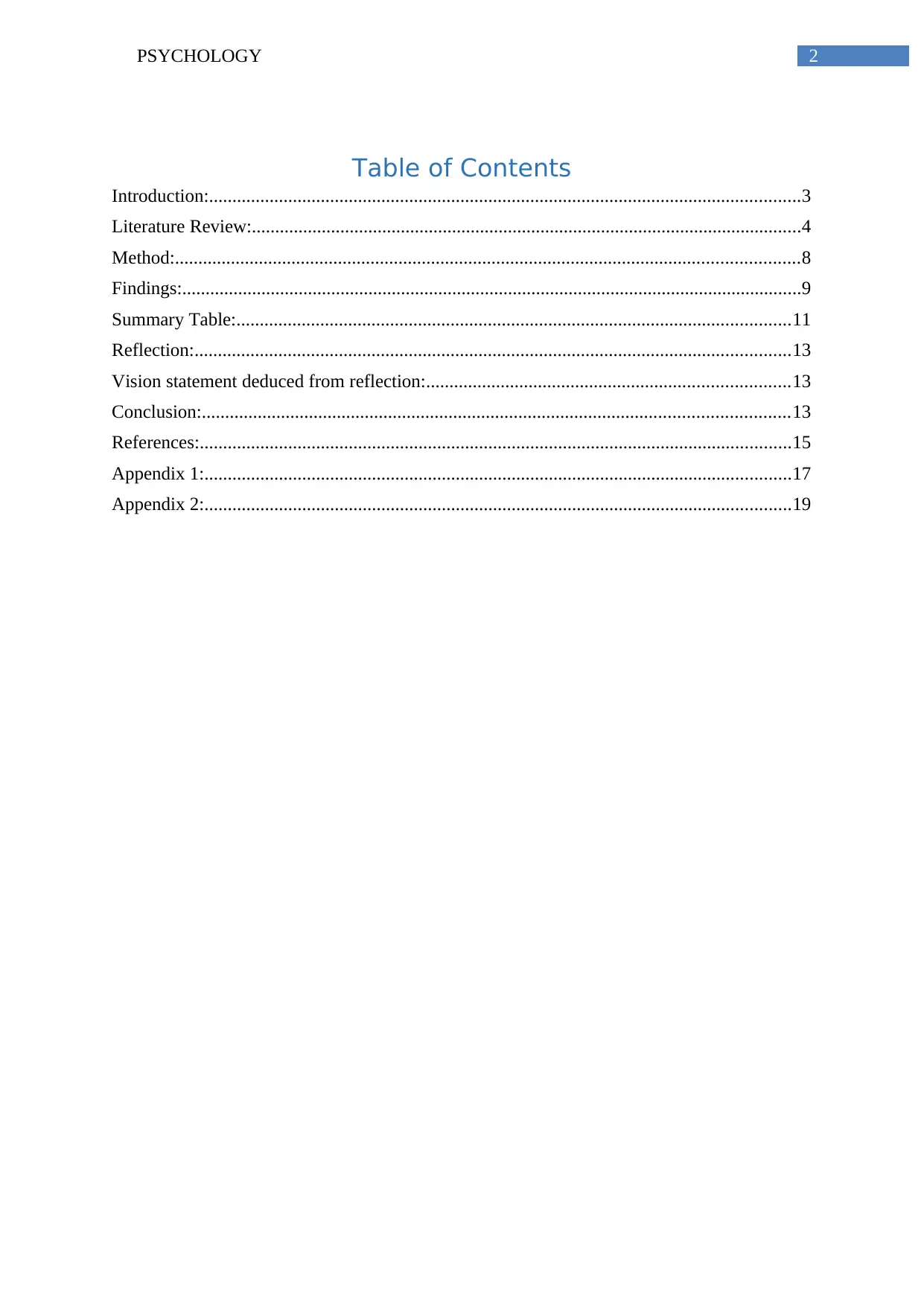
2PSYCHOLOGY
Table of Contents
Introduction:...............................................................................................................................3
Literature Review:......................................................................................................................4
Method:......................................................................................................................................8
Findings:.....................................................................................................................................9
Summary Table:.......................................................................................................................11
Reflection:................................................................................................................................13
Vision statement deduced from reflection:..............................................................................13
Conclusion:..............................................................................................................................13
References:...............................................................................................................................15
Appendix 1:..............................................................................................................................17
Appendix 2:..............................................................................................................................19
Table of Contents
Introduction:...............................................................................................................................3
Literature Review:......................................................................................................................4
Method:......................................................................................................................................8
Findings:.....................................................................................................................................9
Summary Table:.......................................................................................................................11
Reflection:................................................................................................................................13
Vision statement deduced from reflection:..............................................................................13
Conclusion:..............................................................................................................................13
References:...............................................................................................................................15
Appendix 1:..............................................................................................................................17
Appendix 2:..............................................................................................................................19
⊘ This is a preview!⊘
Do you want full access?
Subscribe today to unlock all pages.

Trusted by 1+ million students worldwide
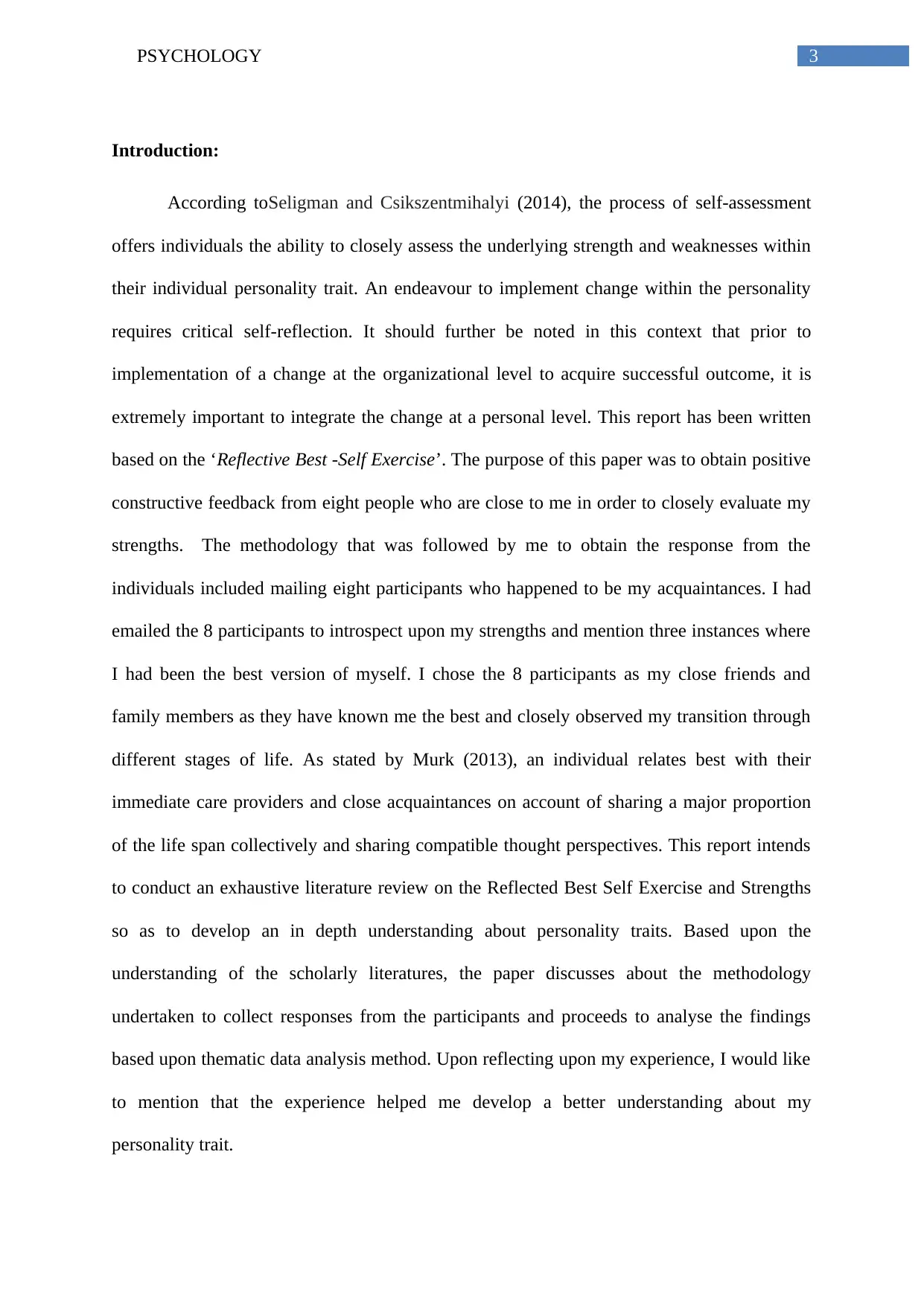
3PSYCHOLOGY
Introduction:
According toSeligman and Csikszentmihalyi (2014), the process of self-assessment
offers individuals the ability to closely assess the underlying strength and weaknesses within
their individual personality trait. An endeavour to implement change within the personality
requires critical self-reflection. It should further be noted in this context that prior to
implementation of a change at the organizational level to acquire successful outcome, it is
extremely important to integrate the change at a personal level. This report has been written
based on the ‘Reflective Best -Self Exercise’. The purpose of this paper was to obtain positive
constructive feedback from eight people who are close to me in order to closely evaluate my
strengths. The methodology that was followed by me to obtain the response from the
individuals included mailing eight participants who happened to be my acquaintances. I had
emailed the 8 participants to introspect upon my strengths and mention three instances where
I had been the best version of myself. I chose the 8 participants as my close friends and
family members as they have known me the best and closely observed my transition through
different stages of life. As stated by Murk (2013), an individual relates best with their
immediate care providers and close acquaintances on account of sharing a major proportion
of the life span collectively and sharing compatible thought perspectives. This report intends
to conduct an exhaustive literature review on the Reflected Best Self Exercise and Strengths
so as to develop an in depth understanding about personality traits. Based upon the
understanding of the scholarly literatures, the paper discusses about the methodology
undertaken to collect responses from the participants and proceeds to analyse the findings
based upon thematic data analysis method. Upon reflecting upon my experience, I would like
to mention that the experience helped me develop a better understanding about my
personality trait.
Introduction:
According toSeligman and Csikszentmihalyi (2014), the process of self-assessment
offers individuals the ability to closely assess the underlying strength and weaknesses within
their individual personality trait. An endeavour to implement change within the personality
requires critical self-reflection. It should further be noted in this context that prior to
implementation of a change at the organizational level to acquire successful outcome, it is
extremely important to integrate the change at a personal level. This report has been written
based on the ‘Reflective Best -Self Exercise’. The purpose of this paper was to obtain positive
constructive feedback from eight people who are close to me in order to closely evaluate my
strengths. The methodology that was followed by me to obtain the response from the
individuals included mailing eight participants who happened to be my acquaintances. I had
emailed the 8 participants to introspect upon my strengths and mention three instances where
I had been the best version of myself. I chose the 8 participants as my close friends and
family members as they have known me the best and closely observed my transition through
different stages of life. As stated by Murk (2013), an individual relates best with their
immediate care providers and close acquaintances on account of sharing a major proportion
of the life span collectively and sharing compatible thought perspectives. This report intends
to conduct an exhaustive literature review on the Reflected Best Self Exercise and Strengths
so as to develop an in depth understanding about personality traits. Based upon the
understanding of the scholarly literatures, the paper discusses about the methodology
undertaken to collect responses from the participants and proceeds to analyse the findings
based upon thematic data analysis method. Upon reflecting upon my experience, I would like
to mention that the experience helped me develop a better understanding about my
personality trait.
Paraphrase This Document
Need a fresh take? Get an instant paraphrase of this document with our AI Paraphraser
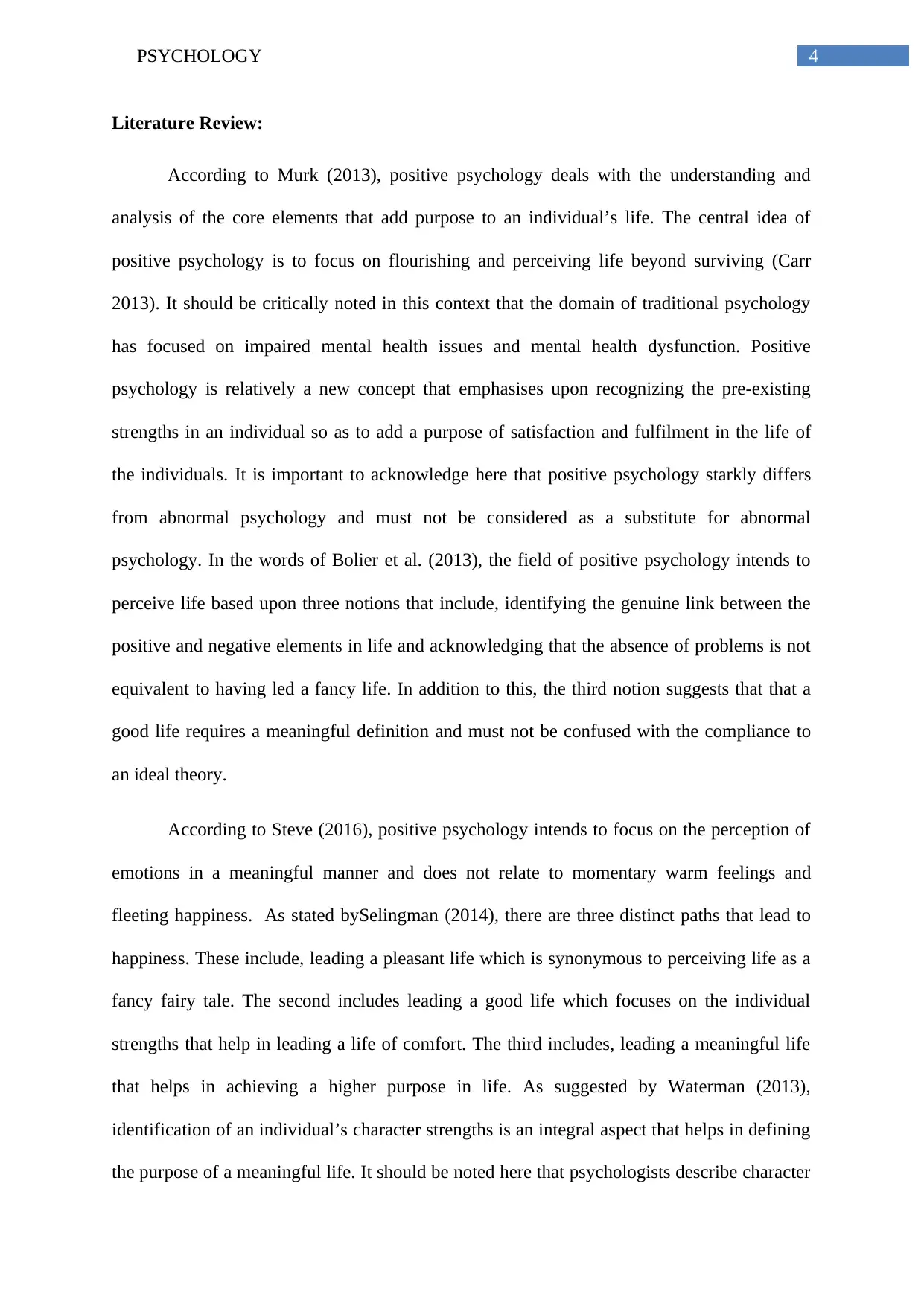
4PSYCHOLOGY
Literature Review:
According to Murk (2013), positive psychology deals with the understanding and
analysis of the core elements that add purpose to an individual’s life. The central idea of
positive psychology is to focus on flourishing and perceiving life beyond surviving (Carr
2013). It should be critically noted in this context that the domain of traditional psychology
has focused on impaired mental health issues and mental health dysfunction. Positive
psychology is relatively a new concept that emphasises upon recognizing the pre-existing
strengths in an individual so as to add a purpose of satisfaction and fulfilment in the life of
the individuals. It is important to acknowledge here that positive psychology starkly differs
from abnormal psychology and must not be considered as a substitute for abnormal
psychology. In the words of Bolier et al. (2013), the field of positive psychology intends to
perceive life based upon three notions that include, identifying the genuine link between the
positive and negative elements in life and acknowledging that the absence of problems is not
equivalent to having led a fancy life. In addition to this, the third notion suggests that that a
good life requires a meaningful definition and must not be confused with the compliance to
an ideal theory.
According to Steve (2016), positive psychology intends to focus on the perception of
emotions in a meaningful manner and does not relate to momentary warm feelings and
fleeting happiness. As stated bySelingman (2014), there are three distinct paths that lead to
happiness. These include, leading a pleasant life which is synonymous to perceiving life as a
fancy fairy tale. The second includes leading a good life which focuses on the individual
strengths that help in leading a life of comfort. The third includes, leading a meaningful life
that helps in achieving a higher purpose in life. As suggested by Waterman (2013),
identification of an individual’s character strengths is an integral aspect that helps in defining
the purpose of a meaningful life. It should be noted here that psychologists describe character
Literature Review:
According to Murk (2013), positive psychology deals with the understanding and
analysis of the core elements that add purpose to an individual’s life. The central idea of
positive psychology is to focus on flourishing and perceiving life beyond surviving (Carr
2013). It should be critically noted in this context that the domain of traditional psychology
has focused on impaired mental health issues and mental health dysfunction. Positive
psychology is relatively a new concept that emphasises upon recognizing the pre-existing
strengths in an individual so as to add a purpose of satisfaction and fulfilment in the life of
the individuals. It is important to acknowledge here that positive psychology starkly differs
from abnormal psychology and must not be considered as a substitute for abnormal
psychology. In the words of Bolier et al. (2013), the field of positive psychology intends to
perceive life based upon three notions that include, identifying the genuine link between the
positive and negative elements in life and acknowledging that the absence of problems is not
equivalent to having led a fancy life. In addition to this, the third notion suggests that that a
good life requires a meaningful definition and must not be confused with the compliance to
an ideal theory.
According to Steve (2016), positive psychology intends to focus on the perception of
emotions in a meaningful manner and does not relate to momentary warm feelings and
fleeting happiness. As stated bySelingman (2014), there are three distinct paths that lead to
happiness. These include, leading a pleasant life which is synonymous to perceiving life as a
fancy fairy tale. The second includes leading a good life which focuses on the individual
strengths that help in leading a life of comfort. The third includes, leading a meaningful life
that helps in achieving a higher purpose in life. As suggested by Waterman (2013),
identification of an individual’s character strengths is an integral aspect that helps in defining
the purpose of a meaningful life. It should be noted here that psychologists describe character
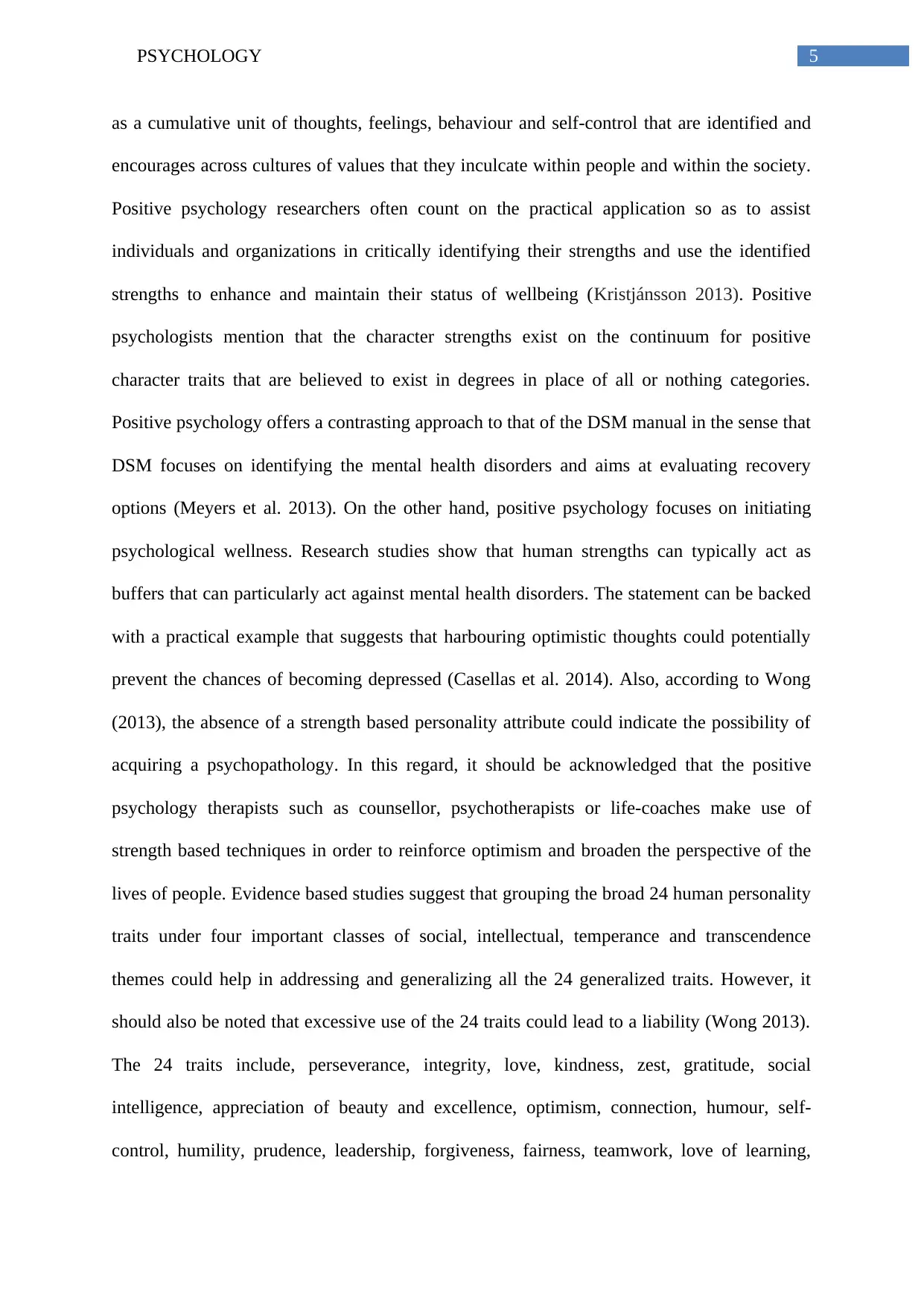
5PSYCHOLOGY
as a cumulative unit of thoughts, feelings, behaviour and self-control that are identified and
encourages across cultures of values that they inculcate within people and within the society.
Positive psychology researchers often count on the practical application so as to assist
individuals and organizations in critically identifying their strengths and use the identified
strengths to enhance and maintain their status of wellbeing (Kristjánsson 2013). Positive
psychologists mention that the character strengths exist on the continuum for positive
character traits that are believed to exist in degrees in place of all or nothing categories.
Positive psychology offers a contrasting approach to that of the DSM manual in the sense that
DSM focuses on identifying the mental health disorders and aims at evaluating recovery
options (Meyers et al. 2013). On the other hand, positive psychology focuses on initiating
psychological wellness. Research studies show that human strengths can typically act as
buffers that can particularly act against mental health disorders. The statement can be backed
with a practical example that suggests that harbouring optimistic thoughts could potentially
prevent the chances of becoming depressed (Casellas et al. 2014). Also, according to Wong
(2013), the absence of a strength based personality attribute could indicate the possibility of
acquiring a psychopathology. In this regard, it should be acknowledged that the positive
psychology therapists such as counsellor, psychotherapists or life-coaches make use of
strength based techniques in order to reinforce optimism and broaden the perspective of the
lives of people. Evidence based studies suggest that grouping the broad 24 human personality
traits under four important classes of social, intellectual, temperance and transcendence
themes could help in addressing and generalizing all the 24 generalized traits. However, it
should also be noted that excessive use of the 24 traits could lead to a liability (Wong 2013).
The 24 traits include, perseverance, integrity, love, kindness, zest, gratitude, social
intelligence, appreciation of beauty and excellence, optimism, connection, humour, self-
control, humility, prudence, leadership, forgiveness, fairness, teamwork, love of learning,
as a cumulative unit of thoughts, feelings, behaviour and self-control that are identified and
encourages across cultures of values that they inculcate within people and within the society.
Positive psychology researchers often count on the practical application so as to assist
individuals and organizations in critically identifying their strengths and use the identified
strengths to enhance and maintain their status of wellbeing (Kristjánsson 2013). Positive
psychologists mention that the character strengths exist on the continuum for positive
character traits that are believed to exist in degrees in place of all or nothing categories.
Positive psychology offers a contrasting approach to that of the DSM manual in the sense that
DSM focuses on identifying the mental health disorders and aims at evaluating recovery
options (Meyers et al. 2013). On the other hand, positive psychology focuses on initiating
psychological wellness. Research studies show that human strengths can typically act as
buffers that can particularly act against mental health disorders. The statement can be backed
with a practical example that suggests that harbouring optimistic thoughts could potentially
prevent the chances of becoming depressed (Casellas et al. 2014). Also, according to Wong
(2013), the absence of a strength based personality attribute could indicate the possibility of
acquiring a psychopathology. In this regard, it should be acknowledged that the positive
psychology therapists such as counsellor, psychotherapists or life-coaches make use of
strength based techniques in order to reinforce optimism and broaden the perspective of the
lives of people. Evidence based studies suggest that grouping the broad 24 human personality
traits under four important classes of social, intellectual, temperance and transcendence
themes could help in addressing and generalizing all the 24 generalized traits. However, it
should also be noted that excessive use of the 24 traits could lead to a liability (Wong 2013).
The 24 traits include, perseverance, integrity, love, kindness, zest, gratitude, social
intelligence, appreciation of beauty and excellence, optimism, connection, humour, self-
control, humility, prudence, leadership, forgiveness, fairness, teamwork, love of learning,
⊘ This is a preview!⊘
Do you want full access?
Subscribe today to unlock all pages.

Trusted by 1+ million students worldwide
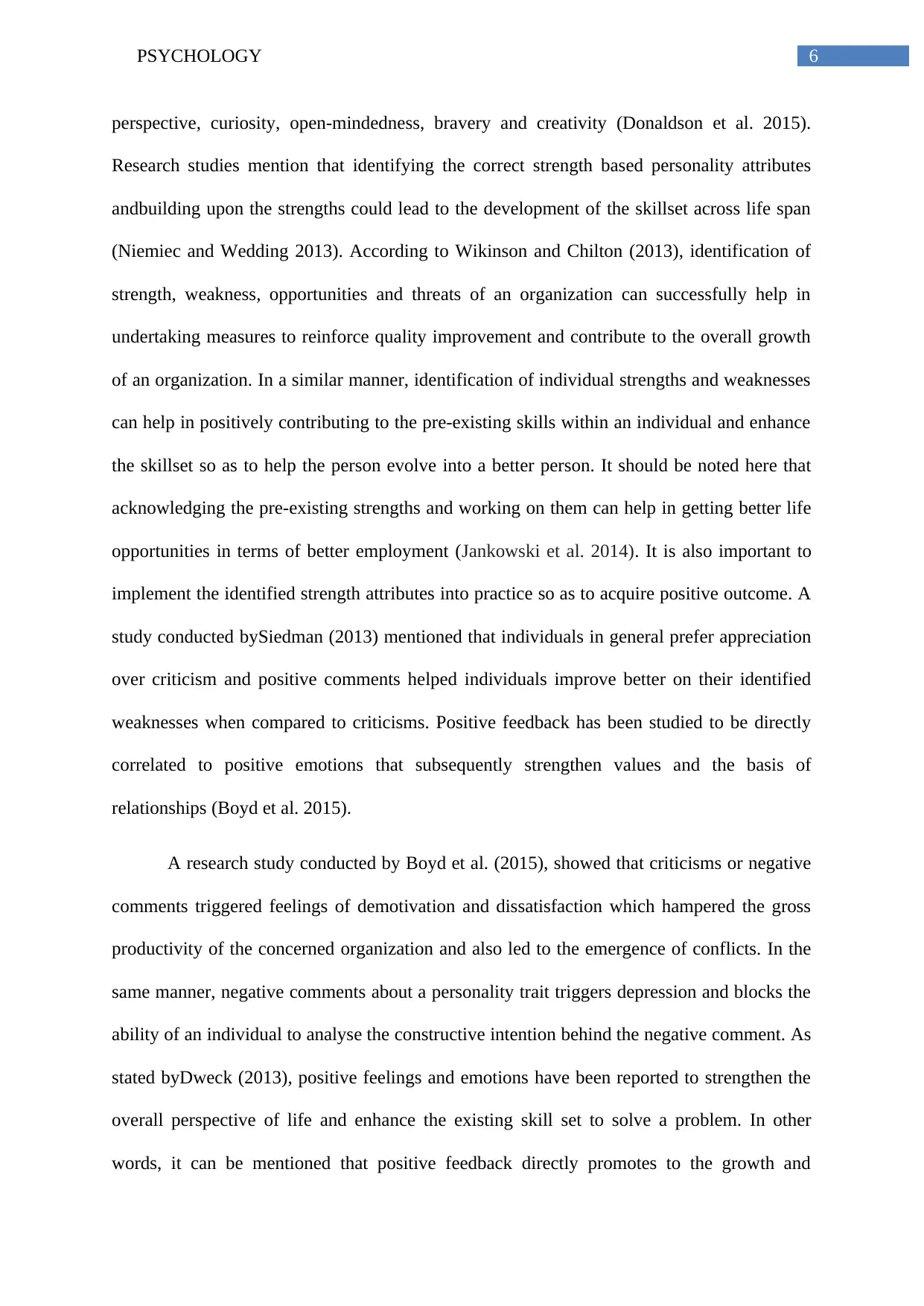
6PSYCHOLOGY
perspective, curiosity, open-mindedness, bravery and creativity (Donaldson et al. 2015).
Research studies mention that identifying the correct strength based personality attributes
andbuilding upon the strengths could lead to the development of the skillset across life span
(Niemiec and Wedding 2013). According to Wikinson and Chilton (2013), identification of
strength, weakness, opportunities and threats of an organization can successfully help in
undertaking measures to reinforce quality improvement and contribute to the overall growth
of an organization. In a similar manner, identification of individual strengths and weaknesses
can help in positively contributing to the pre-existing skills within an individual and enhance
the skillset so as to help the person evolve into a better person. It should be noted here that
acknowledging the pre-existing strengths and working on them can help in getting better life
opportunities in terms of better employment (Jankowski et al. 2014). It is also important to
implement the identified strength attributes into practice so as to acquire positive outcome. A
study conducted bySiedman (2013) mentioned that individuals in general prefer appreciation
over criticism and positive comments helped individuals improve better on their identified
weaknesses when compared to criticisms. Positive feedback has been studied to be directly
correlated to positive emotions that subsequently strengthen values and the basis of
relationships (Boyd et al. 2015).
A research study conducted by Boyd et al. (2015), showed that criticisms or negative
comments triggered feelings of demotivation and dissatisfaction which hampered the gross
productivity of the concerned organization and also led to the emergence of conflicts. In the
same manner, negative comments about a personality trait triggers depression and blocks the
ability of an individual to analyse the constructive intention behind the negative comment. As
stated byDweck (2013), positive feelings and emotions have been reported to strengthen the
overall perspective of life and enhance the existing skill set to solve a problem. In other
words, it can be mentioned that positive feedback directly promotes to the growth and
perspective, curiosity, open-mindedness, bravery and creativity (Donaldson et al. 2015).
Research studies mention that identifying the correct strength based personality attributes
andbuilding upon the strengths could lead to the development of the skillset across life span
(Niemiec and Wedding 2013). According to Wikinson and Chilton (2013), identification of
strength, weakness, opportunities and threats of an organization can successfully help in
undertaking measures to reinforce quality improvement and contribute to the overall growth
of an organization. In a similar manner, identification of individual strengths and weaknesses
can help in positively contributing to the pre-existing skills within an individual and enhance
the skillset so as to help the person evolve into a better person. It should be noted here that
acknowledging the pre-existing strengths and working on them can help in getting better life
opportunities in terms of better employment (Jankowski et al. 2014). It is also important to
implement the identified strength attributes into practice so as to acquire positive outcome. A
study conducted bySiedman (2013) mentioned that individuals in general prefer appreciation
over criticism and positive comments helped individuals improve better on their identified
weaknesses when compared to criticisms. Positive feedback has been studied to be directly
correlated to positive emotions that subsequently strengthen values and the basis of
relationships (Boyd et al. 2015).
A research study conducted by Boyd et al. (2015), showed that criticisms or negative
comments triggered feelings of demotivation and dissatisfaction which hampered the gross
productivity of the concerned organization and also led to the emergence of conflicts. In the
same manner, negative comments about a personality trait triggers depression and blocks the
ability of an individual to analyse the constructive intention behind the negative comment. As
stated byDweck (2013), positive feelings and emotions have been reported to strengthen the
overall perspective of life and enhance the existing skill set to solve a problem. In other
words, it can be mentioned that positive feedback directly promotes to the growth and
Paraphrase This Document
Need a fresh take? Get an instant paraphrase of this document with our AI Paraphraser
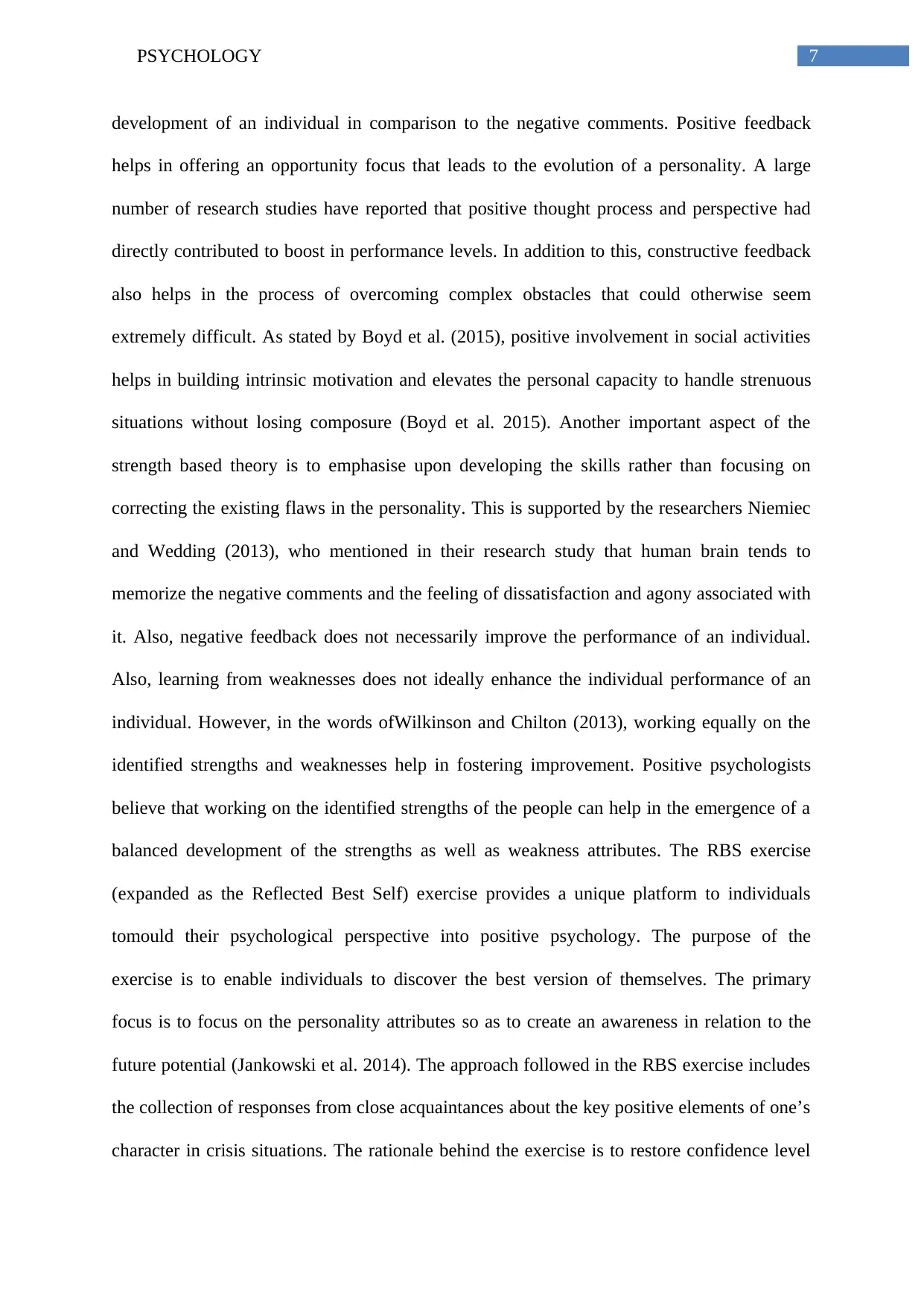
7PSYCHOLOGY
development of an individual in comparison to the negative comments. Positive feedback
helps in offering an opportunity focus that leads to the evolution of a personality. A large
number of research studies have reported that positive thought process and perspective had
directly contributed to boost in performance levels. In addition to this, constructive feedback
also helps in the process of overcoming complex obstacles that could otherwise seem
extremely difficult. As stated by Boyd et al. (2015), positive involvement in social activities
helps in building intrinsic motivation and elevates the personal capacity to handle strenuous
situations without losing composure (Boyd et al. 2015). Another important aspect of the
strength based theory is to emphasise upon developing the skills rather than focusing on
correcting the existing flaws in the personality. This is supported by the researchers Niemiec
and Wedding (2013), who mentioned in their research study that human brain tends to
memorize the negative comments and the feeling of dissatisfaction and agony associated with
it. Also, negative feedback does not necessarily improve the performance of an individual.
Also, learning from weaknesses does not ideally enhance the individual performance of an
individual. However, in the words ofWilkinson and Chilton (2013), working equally on the
identified strengths and weaknesses help in fostering improvement. Positive psychologists
believe that working on the identified strengths of the people can help in the emergence of a
balanced development of the strengths as well as weakness attributes. The RBS exercise
(expanded as the Reflected Best Self) exercise provides a unique platform to individuals
tomould their psychological perspective into positive psychology. The purpose of the
exercise is to enable individuals to discover the best version of themselves. The primary
focus is to focus on the personality attributes so as to create an awareness in relation to the
future potential (Jankowski et al. 2014). The approach followed in the RBS exercise includes
the collection of responses from close acquaintances about the key positive elements of one’s
character in crisis situations. The rationale behind the exercise is to restore confidence level
development of an individual in comparison to the negative comments. Positive feedback
helps in offering an opportunity focus that leads to the evolution of a personality. A large
number of research studies have reported that positive thought process and perspective had
directly contributed to boost in performance levels. In addition to this, constructive feedback
also helps in the process of overcoming complex obstacles that could otherwise seem
extremely difficult. As stated by Boyd et al. (2015), positive involvement in social activities
helps in building intrinsic motivation and elevates the personal capacity to handle strenuous
situations without losing composure (Boyd et al. 2015). Another important aspect of the
strength based theory is to emphasise upon developing the skills rather than focusing on
correcting the existing flaws in the personality. This is supported by the researchers Niemiec
and Wedding (2013), who mentioned in their research study that human brain tends to
memorize the negative comments and the feeling of dissatisfaction and agony associated with
it. Also, negative feedback does not necessarily improve the performance of an individual.
Also, learning from weaknesses does not ideally enhance the individual performance of an
individual. However, in the words ofWilkinson and Chilton (2013), working equally on the
identified strengths and weaknesses help in fostering improvement. Positive psychologists
believe that working on the identified strengths of the people can help in the emergence of a
balanced development of the strengths as well as weakness attributes. The RBS exercise
(expanded as the Reflected Best Self) exercise provides a unique platform to individuals
tomould their psychological perspective into positive psychology. The purpose of the
exercise is to enable individuals to discover the best version of themselves. The primary
focus is to focus on the personality attributes so as to create an awareness in relation to the
future potential (Jankowski et al. 2014). The approach followed in the RBS exercise includes
the collection of responses from close acquaintances about the key positive elements of one’s
character in crisis situations. The rationale behind the exercise is to restore confidence level
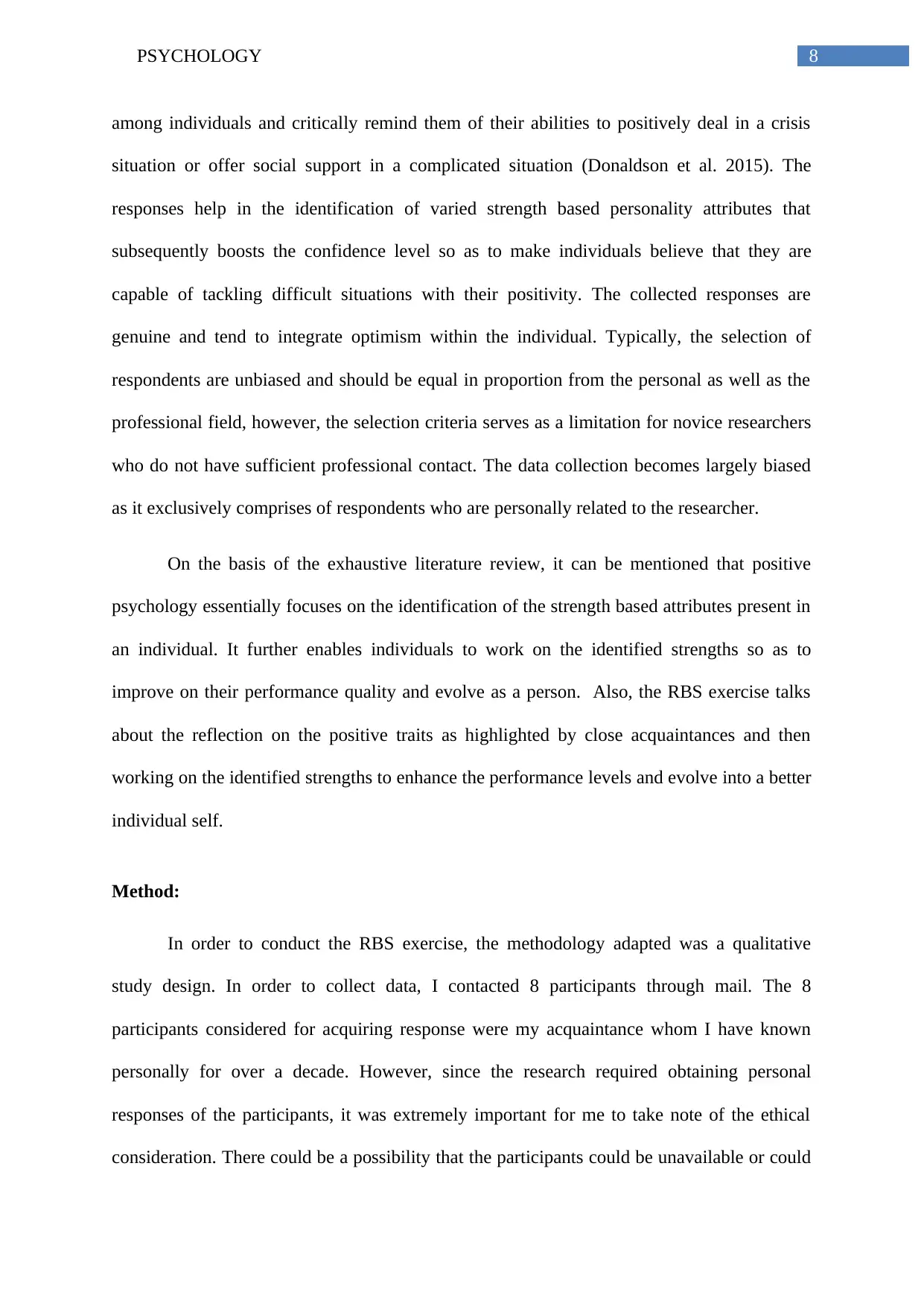
8PSYCHOLOGY
among individuals and critically remind them of their abilities to positively deal in a crisis
situation or offer social support in a complicated situation (Donaldson et al. 2015). The
responses help in the identification of varied strength based personality attributes that
subsequently boosts the confidence level so as to make individuals believe that they are
capable of tackling difficult situations with their positivity. The collected responses are
genuine and tend to integrate optimism within the individual. Typically, the selection of
respondents are unbiased and should be equal in proportion from the personal as well as the
professional field, however, the selection criteria serves as a limitation for novice researchers
who do not have sufficient professional contact. The data collection becomes largely biased
as it exclusively comprises of respondents who are personally related to the researcher.
On the basis of the exhaustive literature review, it can be mentioned that positive
psychology essentially focuses on the identification of the strength based attributes present in
an individual. It further enables individuals to work on the identified strengths so as to
improve on their performance quality and evolve as a person. Also, the RBS exercise talks
about the reflection on the positive traits as highlighted by close acquaintances and then
working on the identified strengths to enhance the performance levels and evolve into a better
individual self.
Method:
In order to conduct the RBS exercise, the methodology adapted was a qualitative
study design. In order to collect data, I contacted 8 participants through mail. The 8
participants considered for acquiring response were my acquaintance whom I have known
personally for over a decade. However, since the research required obtaining personal
responses of the participants, it was extremely important for me to take note of the ethical
consideration. There could be a possibility that the participants could be unavailable or could
among individuals and critically remind them of their abilities to positively deal in a crisis
situation or offer social support in a complicated situation (Donaldson et al. 2015). The
responses help in the identification of varied strength based personality attributes that
subsequently boosts the confidence level so as to make individuals believe that they are
capable of tackling difficult situations with their positivity. The collected responses are
genuine and tend to integrate optimism within the individual. Typically, the selection of
respondents are unbiased and should be equal in proportion from the personal as well as the
professional field, however, the selection criteria serves as a limitation for novice researchers
who do not have sufficient professional contact. The data collection becomes largely biased
as it exclusively comprises of respondents who are personally related to the researcher.
On the basis of the exhaustive literature review, it can be mentioned that positive
psychology essentially focuses on the identification of the strength based attributes present in
an individual. It further enables individuals to work on the identified strengths so as to
improve on their performance quality and evolve as a person. Also, the RBS exercise talks
about the reflection on the positive traits as highlighted by close acquaintances and then
working on the identified strengths to enhance the performance levels and evolve into a better
individual self.
Method:
In order to conduct the RBS exercise, the methodology adapted was a qualitative
study design. In order to collect data, I contacted 8 participants through mail. The 8
participants considered for acquiring response were my acquaintance whom I have known
personally for over a decade. However, since the research required obtaining personal
responses of the participants, it was extremely important for me to take note of the ethical
consideration. There could be a possibility that the participants could be unavailable or could
⊘ This is a preview!⊘
Do you want full access?
Subscribe today to unlock all pages.

Trusted by 1+ million students worldwide
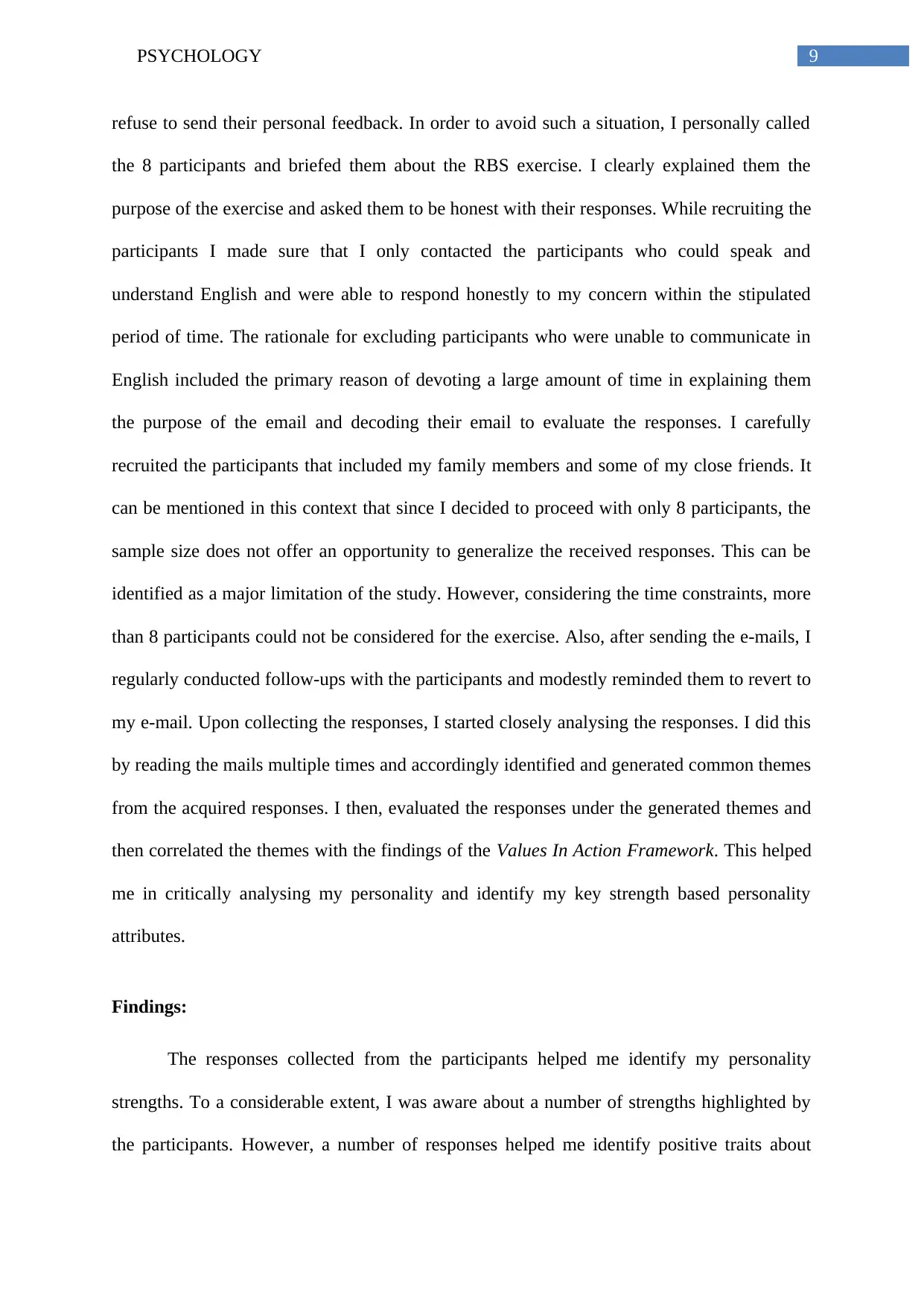
9PSYCHOLOGY
refuse to send their personal feedback. In order to avoid such a situation, I personally called
the 8 participants and briefed them about the RBS exercise. I clearly explained them the
purpose of the exercise and asked them to be honest with their responses. While recruiting the
participants I made sure that I only contacted the participants who could speak and
understand English and were able to respond honestly to my concern within the stipulated
period of time. The rationale for excluding participants who were unable to communicate in
English included the primary reason of devoting a large amount of time in explaining them
the purpose of the email and decoding their email to evaluate the responses. I carefully
recruited the participants that included my family members and some of my close friends. It
can be mentioned in this context that since I decided to proceed with only 8 participants, the
sample size does not offer an opportunity to generalize the received responses. This can be
identified as a major limitation of the study. However, considering the time constraints, more
than 8 participants could not be considered for the exercise. Also, after sending the e-mails, I
regularly conducted follow-ups with the participants and modestly reminded them to revert to
my e-mail. Upon collecting the responses, I started closely analysing the responses. I did this
by reading the mails multiple times and accordingly identified and generated common themes
from the acquired responses. I then, evaluated the responses under the generated themes and
then correlated the themes with the findings of the Values In Action Framework. This helped
me in critically analysing my personality and identify my key strength based personality
attributes.
Findings:
The responses collected from the participants helped me identify my personality
strengths. To a considerable extent, I was aware about a number of strengths highlighted by
the participants. However, a number of responses helped me identify positive traits about
refuse to send their personal feedback. In order to avoid such a situation, I personally called
the 8 participants and briefed them about the RBS exercise. I clearly explained them the
purpose of the exercise and asked them to be honest with their responses. While recruiting the
participants I made sure that I only contacted the participants who could speak and
understand English and were able to respond honestly to my concern within the stipulated
period of time. The rationale for excluding participants who were unable to communicate in
English included the primary reason of devoting a large amount of time in explaining them
the purpose of the email and decoding their email to evaluate the responses. I carefully
recruited the participants that included my family members and some of my close friends. It
can be mentioned in this context that since I decided to proceed with only 8 participants, the
sample size does not offer an opportunity to generalize the received responses. This can be
identified as a major limitation of the study. However, considering the time constraints, more
than 8 participants could not be considered for the exercise. Also, after sending the e-mails, I
regularly conducted follow-ups with the participants and modestly reminded them to revert to
my e-mail. Upon collecting the responses, I started closely analysing the responses. I did this
by reading the mails multiple times and accordingly identified and generated common themes
from the acquired responses. I then, evaluated the responses under the generated themes and
then correlated the themes with the findings of the Values In Action Framework. This helped
me in critically analysing my personality and identify my key strength based personality
attributes.
Findings:
The responses collected from the participants helped me identify my personality
strengths. To a considerable extent, I was aware about a number of strengths highlighted by
the participants. However, a number of responses helped me identify positive traits about
Paraphrase This Document
Need a fresh take? Get an instant paraphrase of this document with our AI Paraphraser
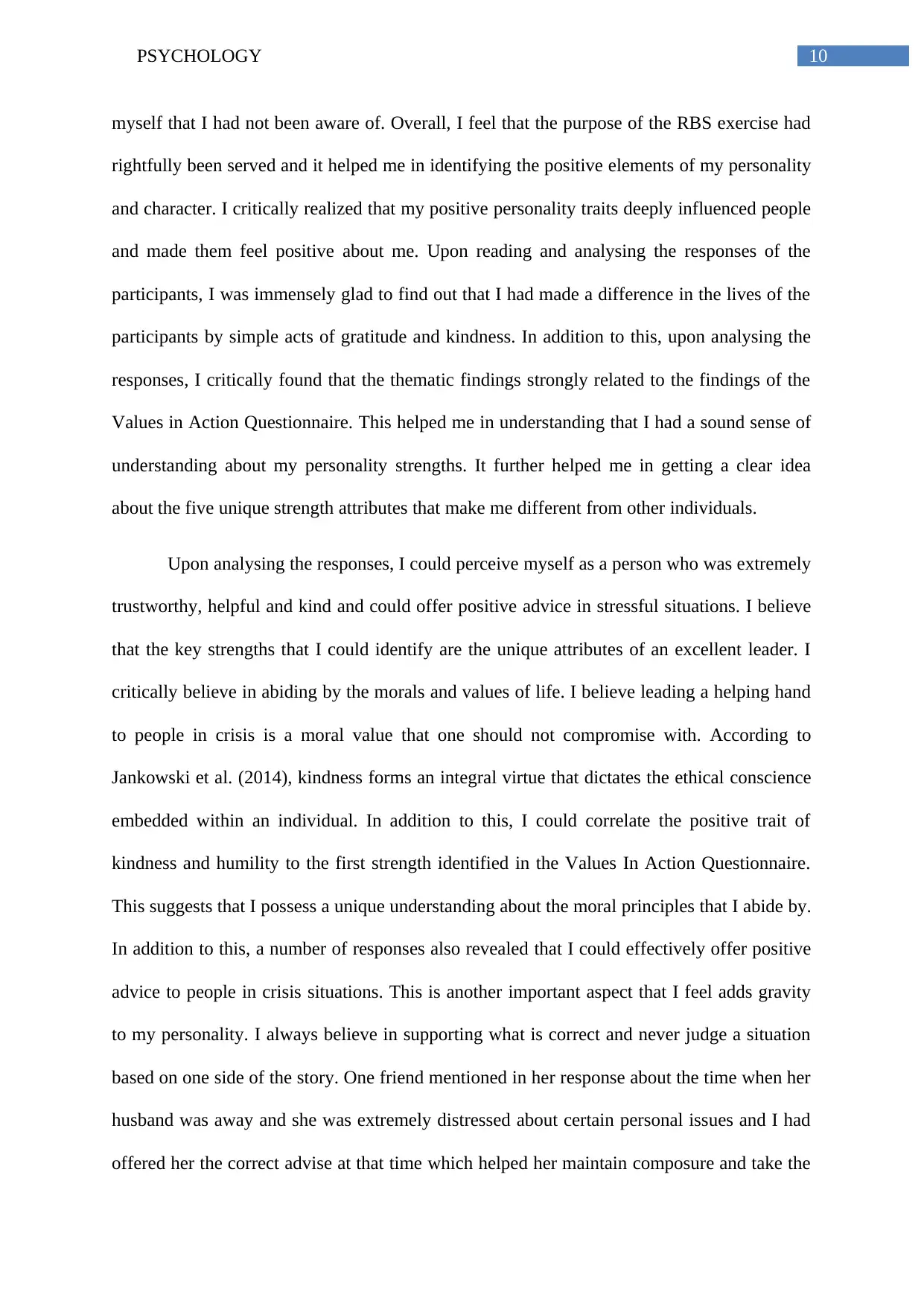
10PSYCHOLOGY
myself that I had not been aware of. Overall, I feel that the purpose of the RBS exercise had
rightfully been served and it helped me in identifying the positive elements of my personality
and character. I critically realized that my positive personality traits deeply influenced people
and made them feel positive about me. Upon reading and analysing the responses of the
participants, I was immensely glad to find out that I had made a difference in the lives of the
participants by simple acts of gratitude and kindness. In addition to this, upon analysing the
responses, I critically found that the thematic findings strongly related to the findings of the
Values in Action Questionnaire. This helped me in understanding that I had a sound sense of
understanding about my personality strengths. It further helped me in getting a clear idea
about the five unique strength attributes that make me different from other individuals.
Upon analysing the responses, I could perceive myself as a person who was extremely
trustworthy, helpful and kind and could offer positive advice in stressful situations. I believe
that the key strengths that I could identify are the unique attributes of an excellent leader. I
critically believe in abiding by the morals and values of life. I believe leading a helping hand
to people in crisis is a moral value that one should not compromise with. According to
Jankowski et al. (2014), kindness forms an integral virtue that dictates the ethical conscience
embedded within an individual. In addition to this, I could correlate the positive trait of
kindness and humility to the first strength identified in the Values In Action Questionnaire.
This suggests that I possess a unique understanding about the moral principles that I abide by.
In addition to this, a number of responses also revealed that I could effectively offer positive
advice to people in crisis situations. This is another important aspect that I feel adds gravity
to my personality. I always believe in supporting what is correct and never judge a situation
based on one side of the story. One friend mentioned in her response about the time when her
husband was away and she was extremely distressed about certain personal issues and I had
offered her the correct advise at that time which helped her maintain composure and take the
myself that I had not been aware of. Overall, I feel that the purpose of the RBS exercise had
rightfully been served and it helped me in identifying the positive elements of my personality
and character. I critically realized that my positive personality traits deeply influenced people
and made them feel positive about me. Upon reading and analysing the responses of the
participants, I was immensely glad to find out that I had made a difference in the lives of the
participants by simple acts of gratitude and kindness. In addition to this, upon analysing the
responses, I critically found that the thematic findings strongly related to the findings of the
Values in Action Questionnaire. This helped me in understanding that I had a sound sense of
understanding about my personality strengths. It further helped me in getting a clear idea
about the five unique strength attributes that make me different from other individuals.
Upon analysing the responses, I could perceive myself as a person who was extremely
trustworthy, helpful and kind and could offer positive advice in stressful situations. I believe
that the key strengths that I could identify are the unique attributes of an excellent leader. I
critically believe in abiding by the morals and values of life. I believe leading a helping hand
to people in crisis is a moral value that one should not compromise with. According to
Jankowski et al. (2014), kindness forms an integral virtue that dictates the ethical conscience
embedded within an individual. In addition to this, I could correlate the positive trait of
kindness and humility to the first strength identified in the Values In Action Questionnaire.
This suggests that I possess a unique understanding about the moral principles that I abide by.
In addition to this, a number of responses also revealed that I could effectively offer positive
advice to people in crisis situations. This is another important aspect that I feel adds gravity
to my personality. I always believe in supporting what is correct and never judge a situation
based on one side of the story. One friend mentioned in her response about the time when her
husband was away and she was extremely distressed about certain personal issues and I had
offered her the correct advise at that time which helped her maintain composure and take the
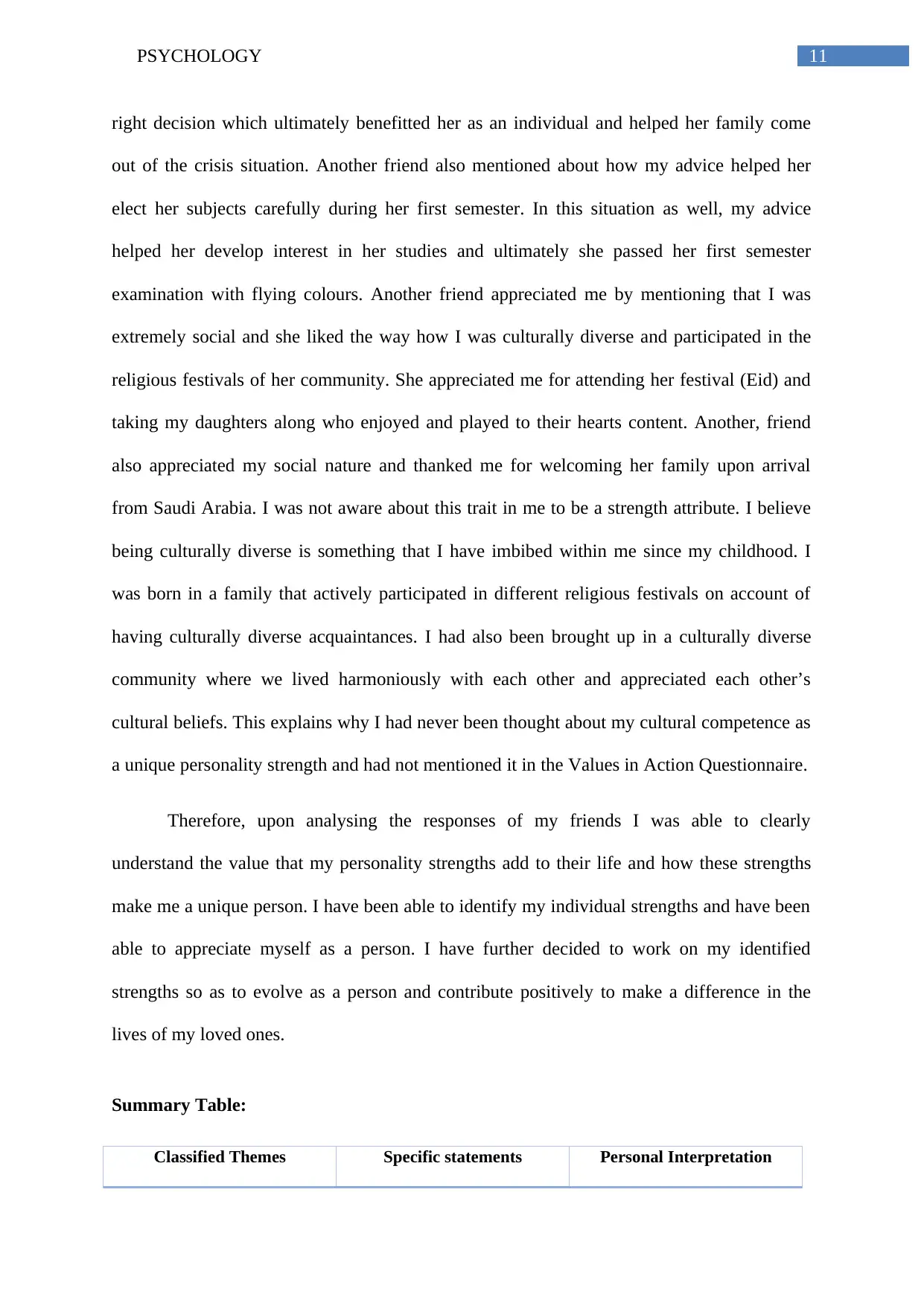
11PSYCHOLOGY
right decision which ultimately benefitted her as an individual and helped her family come
out of the crisis situation. Another friend also mentioned about how my advice helped her
elect her subjects carefully during her first semester. In this situation as well, my advice
helped her develop interest in her studies and ultimately she passed her first semester
examination with flying colours. Another friend appreciated me by mentioning that I was
extremely social and she liked the way how I was culturally diverse and participated in the
religious festivals of her community. She appreciated me for attending her festival (Eid) and
taking my daughters along who enjoyed and played to their hearts content. Another, friend
also appreciated my social nature and thanked me for welcoming her family upon arrival
from Saudi Arabia. I was not aware about this trait in me to be a strength attribute. I believe
being culturally diverse is something that I have imbibed within me since my childhood. I
was born in a family that actively participated in different religious festivals on account of
having culturally diverse acquaintances. I had also been brought up in a culturally diverse
community where we lived harmoniously with each other and appreciated each other’s
cultural beliefs. This explains why I had never been thought about my cultural competence as
a unique personality strength and had not mentioned it in the Values in Action Questionnaire.
Therefore, upon analysing the responses of my friends I was able to clearly
understand the value that my personality strengths add to their life and how these strengths
make me a unique person. I have been able to identify my individual strengths and have been
able to appreciate myself as a person. I have further decided to work on my identified
strengths so as to evolve as a person and contribute positively to make a difference in the
lives of my loved ones.
Summary Table:
Classified Themes Specific statements Personal Interpretation
right decision which ultimately benefitted her as an individual and helped her family come
out of the crisis situation. Another friend also mentioned about how my advice helped her
elect her subjects carefully during her first semester. In this situation as well, my advice
helped her develop interest in her studies and ultimately she passed her first semester
examination with flying colours. Another friend appreciated me by mentioning that I was
extremely social and she liked the way how I was culturally diverse and participated in the
religious festivals of her community. She appreciated me for attending her festival (Eid) and
taking my daughters along who enjoyed and played to their hearts content. Another, friend
also appreciated my social nature and thanked me for welcoming her family upon arrival
from Saudi Arabia. I was not aware about this trait in me to be a strength attribute. I believe
being culturally diverse is something that I have imbibed within me since my childhood. I
was born in a family that actively participated in different religious festivals on account of
having culturally diverse acquaintances. I had also been brought up in a culturally diverse
community where we lived harmoniously with each other and appreciated each other’s
cultural beliefs. This explains why I had never been thought about my cultural competence as
a unique personality strength and had not mentioned it in the Values in Action Questionnaire.
Therefore, upon analysing the responses of my friends I was able to clearly
understand the value that my personality strengths add to their life and how these strengths
make me a unique person. I have been able to identify my individual strengths and have been
able to appreciate myself as a person. I have further decided to work on my identified
strengths so as to evolve as a person and contribute positively to make a difference in the
lives of my loved ones.
Summary Table:
Classified Themes Specific statements Personal Interpretation
⊘ This is a preview!⊘
Do you want full access?
Subscribe today to unlock all pages.

Trusted by 1+ million students worldwide
1 out of 24
Related Documents
Your All-in-One AI-Powered Toolkit for Academic Success.
+13062052269
info@desklib.com
Available 24*7 on WhatsApp / Email
![[object Object]](/_next/static/media/star-bottom.7253800d.svg)
Unlock your academic potential
Copyright © 2020–2025 A2Z Services. All Rights Reserved. Developed and managed by ZUCOL.




